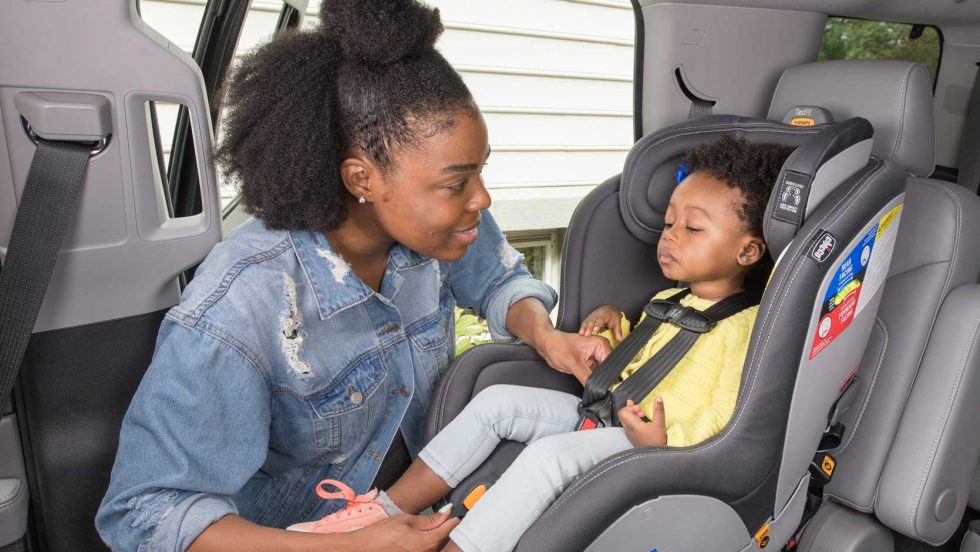
Per Zero Deaths Maryland, “In April 2022, Maryland lawmakers passed SB 176, a bill that will upgrade the state’s law that protects children traveling on our roadways. The new law goes into effect on October 1, 2022, and states that children must be kept rear-facing until at least two years of age, unless the child meets or exceeds the height and weight on the seat’s guidelines. Having a seat that properly fits the child is also another important consideration. SB 176 brought Maryland in line with laws in 16 other states (CA, CT, IL, LA, ME, NE, NJ, NY, NV, OK, OR, PA, RI, SC, VA, WA) and the District of Columbia.”
In April 2022, Maryland lawmakers passed SB 176, a bill that will upgrade the state’s law that protects children traveling on our roadways. The new law goes into effect on October 1, 2022, and states that children must be kept rear-facing until at least two years of age, unless the child meets or exceeds the height and weight on the seat’s guidelines. Having a seat that properly fits the child is also another important consideration. SB 176 brought Maryland in line with laws in 16 other states (CA, CT, IL, LA, ME, NE, NJ, NY, NV, OK, OR, PA, RI, SC, VA, WA) and the District of Columbia.
The American Academy of Pediatrics (AAP) and the National Highway Traffic Safety Administration (NHTSA) state that children should ride rear-facing for as long as possible. Rear-facing child seats do a better job of supporting the head, neck and spine of infants and toddlers in a crash, and the back of the seat takes most of the impact energy. When children ride forward-facing, their heads are thrown forward in a crash, possibly resulting in serious injuries. Before SB 176, Maryland law only required a child to ride in a car seat until reaching at least 4’ 9” in height. The Maryland Department of Transportation supported the revision of the law to help guide parents on keeping a child rear-facing, something that was not addressed by the prior law.
The inclusion of age for rear-facing child seats helps law enforcement officers educate drivers on proper child passenger safety and gives clearer guidance for caregivers. Under the prior law, no guidance was provided for rear facing. This new bill helps bring attention to the fact that children under two are better protected in a crash when riding rear facing. Under SB 176, only a written warning may be issued for the first violation, supporting law enforcement’s request to use the new law as a teaching moment for drivers rather than a fine.
The October 1 start date gives partners time to build strong campaigns as well as caregivers time to prepare for the change in law. Some who currently have a child in a forward-facing-only seat will find that a convertible seat – one that can be used forward- and rear-facing – may better protect their child. Such seats may also prove to be easier to use and more cost-effective.
Kids in Safety Seats (KISS) supports a volunteer network that offers Car Seat Assistance Programs (CSAP) to the community. A CSAP offers low-cost options (convertible or combination seats) to the public for those in need. Referrals to the programs are made primarily through the KISS Helpline or email.
For more information on selecting the right car seat, please visit NHTSA’s website at:
https://www.nhtsa.gov/equipment/car-seats-and-booster-seats#car-seat-types
Featured image by Zero Deaths MD
Recent Stories
The NOW Massage, a growing franchise that describes itself as “disrupting the wellness space with high quality, affordable massage services in an inspired setting” is now open in Bethesda. The…
FEST OF SPRING Caribbean Wine Food & Music Festival
Get ready to experience the vibrant colors, tantalizing flavors, and infectious rhythms of the Caribbean at the FEST OF SPRING Caribbean Wine Food & Music Festival! Hosted by RHU LLC, this exciting festival is set to take place on May 18, 2024, at the picturesque 16700 Barnesville Rd in Boyds, MD.
Step into a world where the Caribbean spirit comes alive! From 12:00 PM onwards, immerse yourself in a sensory journey that celebrates the unique culture, cuisine, and music of the Caribbean. Whether you're an African American, a Reggae or Soca music enthusiast, a wine lover, or part of the vibrant Caribbean diaspora, this festival promises to delight and captivate you in every way.
Let the enticing aromas of mouthwatering Caribbean dishes tantalize your taste buds. Feast on traditional delicacies prepared by expert chefs, showcasing the rich and diverse culinary heritage of the Caribbean. Indulge in flavorful jerk chicken, succulent seafood, and delectable plantain dishes that will transport you straight to the islands.
Accompanying the culinary extravaganza is a carefully curated selection of premium wines, ensuring the perfect pairing for your palate. Sip on fine wines from renowned vineyards, each sip a reflection of the Caribbean's vibrant spirit. Discover new flavors, expand your wine knowledge, and savor unforgettable moments with every glass.
As the sun sets, get ready to groove to the infectious rhythms of Caribbean music. Feel the pulsating beats of reggae, soca, dancehall, and calypso, moving your body to the lively melodies. Live performances by talented musicians and performers will keep the energy high, ensuring a night of unforgettable entertainment.
Don't miss this opportunity to embrace the Caribbean spirit and celebrate the arrival of spring in style! Tickets are available on AllEvents, so secure your spot today. Join us at the FEST OF SPRING Caribbean Wine Food & Music Festival, where cultures collide and unforgettable memories are made.
LIVE PERFORMANCES By: CULTURE Feat. Kenyatta Hill, EXCO LEVI, IMAGE BAND, RAS LIDJ REGG'GO with Special Guest SUGAR BEAR FROM E.U. & MORE! & MORE!
MUSIC By: DJ ABLAZE, DJ SMALLY & NAJ SUPREME
2 NIGHT Camping packages available: RV/CAMPER $200 | TENTS $150 Starting on Friday May 17 @ 5pm | 30 RV SPACES | 30+ TENT SPACES
KIDS 12 & UNDER FREE!!!





